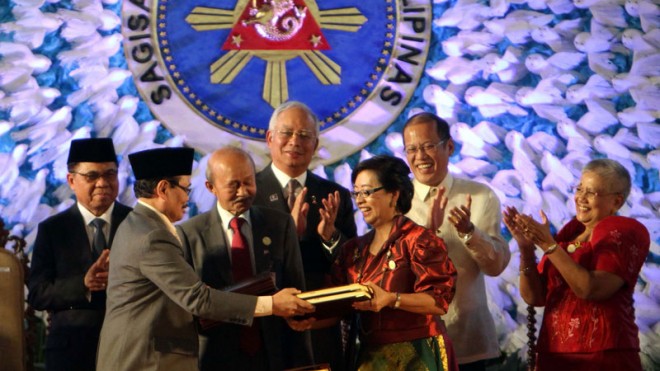Moro basic law priority

PEACE ACCORD. Mohagher Iqbal, chief MILF negotiator, and Miriam Coronel-Ferrer, head of the government negotiating panel, exchange copies of the peace agreement between the MILF and the Aquino administration they signed in Malacañang on March 27. Applauding them are MILF Chair Murad Ebrahim, Malaysian facilitator Abdul Ghafar,Malaysian Prime Minister Najib Razak, President Aquino and Presidential Adviser on the Peace Process Teresita Deles. LYN RILLON
The House of Representatives will give priority to the draft Bangsamoro basic law, but will not completely sideline other important measures pending in the plenary, Speaker Feliciano Belmonte said on Tuesday.
In a text message to the Inquirer, Belmonte also said he hoped to have the draft law approved on third and final reading by the end of the year.
The Palace is expected to submit the Bangsamoro bill to Congress when it resumes sessions on May 5.
“We will give it priority but not exclusivity,” Belmonte said when asked if deliberations on other measures will be stopped once the Bangsamoro bill reaches the floor.
The bill would create a Bangsamoro autonomous region that would replace the Autonomous Region in Muslim Mindanao (ARMM), fleshing out the peace agreement signed by the administration of President Aquino with the Moro Islamic Liberation Front (MILF) last month.
Malacañang and the MILF, the largest rebel organization in Mindanao, expect the Bangsamoro basic law to be challenged in the Supreme Court, but both believe it can stand legal scrutiny.
The Palace said Tuesday that it remained optimistic that the new Bangsamoro autonomous region would be established before President Benigno Aquino III steps down in 2016.
Communications Secretary Herminio Coloma said the Palace legal team reviewing the draft law was “familiar” with it, having been consulted by members of the government peace panel during negotiations with the MILF.
“There is a sense of urgency in being able to complete this review because we are all aware of the indicative timetable,” Coloma told reporters at a briefing in the Palace.
“Even while the [peace] agreement was being negotiated, the [government] panel was consulting regularly with the same panel that is now reviewing the draft law. So we can be [sure] that the people [doing the review] are quite familiar with the agreement,” he said.
Earlier, leaders of both houses of Congress committed to the government timetable of passing the basic law by the end of the year.
Plebiscite
After passage, the basic law would be submitted for approval in a plebiscite in areas in the south that are proposed to be included in the Bangsamoro autonomous region.
The composition of the new autonomous region will be based on the outcome of the plebiscite. Residents of the areas proposed to be included in Bangsamoro will decide whether they want to be part of the new autonomous region.
Core territory
The “core territory” of Bangsamoro will include the five provinces within the ARMM and Marawi City. It will also include the cities of Cotabato and Isabela, and the six municipalities in Lanao del Norte province that voted to become part of the ARMM in a plebiscite in 2001 (Baloi, Munai, Pantar, Nunungan, Tagaloan and Tangkal).
Thirty-nine villages in six North Cotabato towns that voted to be included in the ARMM will also be part of the proposed Bangsamoro. The six towns are Labacan, Carmen, Aleosan, Pigkawaya, Pikit and Midsayap.
The goal is to hold the election for members of the Bangsamoro assembly simultaneously with the national elections in 2016.
The elected Bangsamoro assembly members will then elect a chief minister among themselves.
The chief minister will be the head of the Bangsamoro ministerial government.
Submitted to Palace
Mohagher Iqbal, head of the Bangsamoro Transition Commission, on Monday submitted to Malacañang the draft of the basic law, which was based on the Comprehensive Agreement on the Bangsamoro signed on March 27.
Coloma said he would check whether Iqbal submitted a complete document.
Pending verification, he said, “what is most important … is that the legal team will be able to do everything that is necessary to be able to submit the draft bill to the President for his own review and approval.”
“Throughout the entire process, the [government] and [the] MILF panels have exercised the requisite due diligence, industry and determination in order to complete the agreement and in order to bring it to where it is now,” Coloma said.
“So I think we can say with a reasonable degree of confidence that there is reason to be optimistic that the timetable can be met,” he said.
The House will resume work on several crucial measures when it returns from its Lenten break.
Plenary deliberations are expected on the controversial constitutional amendment and antipolitical dynasty bills, and the budget bill is also expected to be submitted to Congress later in the year, most likely after President Aquino’s State of the Nation Address.
FOI bill
Proponents of the freedom of information (FOI) bill are also hoping to have it approved at the committee level and put through debate before the Bangsamoro bill reaches the floor.
Ifugao Rep. Teddy Baguilat on Tuesday said the FOI bill may not be shunted aside in favor of the Bangsamoro bill, as the information measure was in a more advanced stage.
The Bangsamoro bill is expected to face scrutiny by the minority and several Mindanao legislators as well as constitutionalists, Baguilat noted, which means it may not clear the committee level immediately.
The FOI bill is also still pending with the committee on public information, but Baguilat said that as long as its proponents stick to their game plan and the chair sets regular meetings, there should be no problem in getting the measure out of the committee.
Earlier, Belmonte promised that the FOI bill would be approved by the House before the end of his term.
RELATED STORIES
Aquino allies vow quick passage of Bangsamoro law; militants call for close scrutiny
UN hopes Bangsamoro law will bring lasting peace